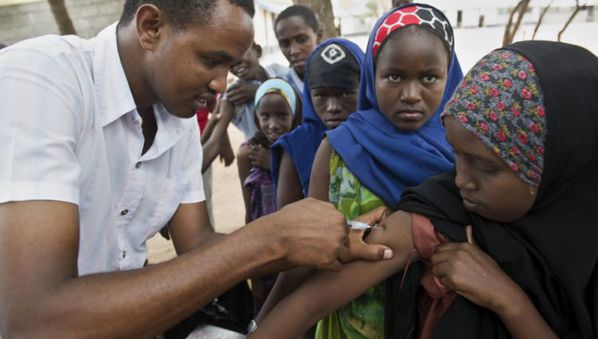By Valentina Jovanovski
Health workers in Kenya’s refugee camps would be more likely to stick with their jobs if they were offered more training and the possibility of academic qualifications, according to a study.
Healthcare assistants who are from the refugee community act as a crucial link between refugees and the health system of their host country, Beryl Pilkington, researcher from York University, UK, told this week’s Society for the Advancement of Science in Africa’s conference in Toronto, Canada. They also informally provide services such as health education, screening for disease and counselling, in collaboration with trained health professionals, she said.
But the study highlights that most health workers do not stay in their jobs for long as lack of pay and career progression make this crucial role unattractive for them.
“One of the things that gives people a leg-up in the world is education, something refugees don’t have access to.”
Beryl Pilkington, York University, UK
The study was conducted in 2014 in refugee camps in Kenya, mainly housing Somalis, and funded by the Canada’s International Development Research Centre. The aim was to test whether a custom-designed degree programme could be designed for such workers and to see what knowledge and skills it would need to provide.
Pilkington said community health workers expressed a desire for higher education and felt they lacked training in essential areas, including prevention of disease outbreaks, reproductive health and maternal and child health, as well as conflict management — important to work in refugee camps.
“Many of these areas are largely being managed by poorly trained community health workers, Pilkington told the conference. “That’s a lot to ask of them with very little training.”
Refugee health workers are often left to their own devices, she said, because every time there is a security incident other healthcare staff leave for safety reasons.
But beyond specific skills, John Kirya, who works for Toronto Public Health, the city’s health department, and was previously a doctor in western Uganda, said lack of basic knowledge, particularly in language and maths, is a big obstacle.
For example, he said even trained health workers he worked with in Uganda were not able to tell the difference between the expressions ‘half’ and ‘0.5’ — which is dangerous if they are responsible for dispensing medication.
“We believe we lost some of our patients because of the way these people were practising,” he said.
Patrick Mbullo, a social anthropology master’s student at York University in Toronto, who previously worked in training community health workers, agreed it was difficult to retain these workers. This, he said, was because they are often volunteers and only paid a stipend. Although they are passionate about their work, there is no financial incentive to stick around if they find employment elsewhere, he said.
Pilkington also said part of the problem is that health workers in Kenya’s refugee camps are not eligible for employment and are therefore not paid for their work.
Workers should have an opportunity to obtain transferable skills that they can use in the camps and employ in their home country, should they return there, she said.
“One of the things that gives people a leg-up in the world is education, something refugees don’t have access to,” Pilkington said.
This article was originally published on SciDev.Net. Read the original article.


